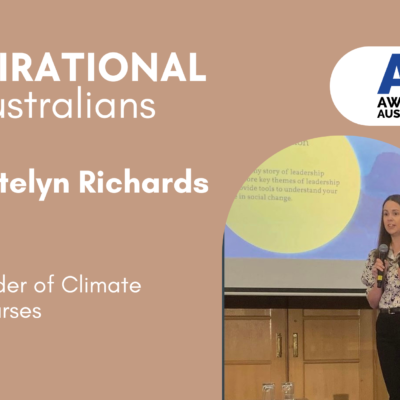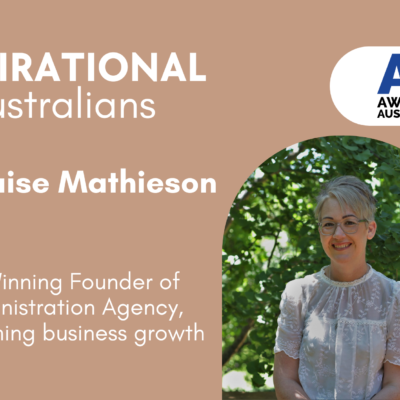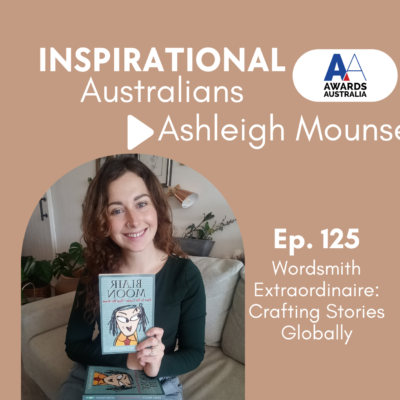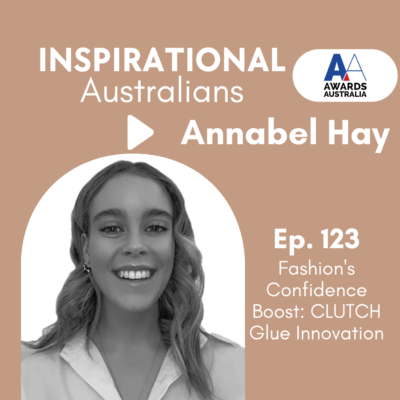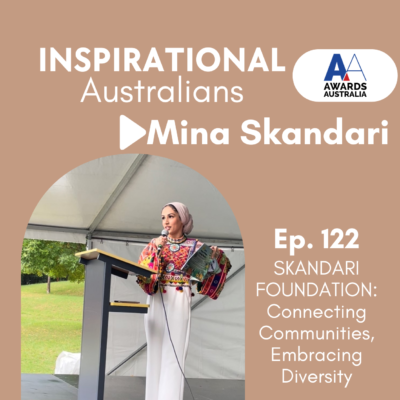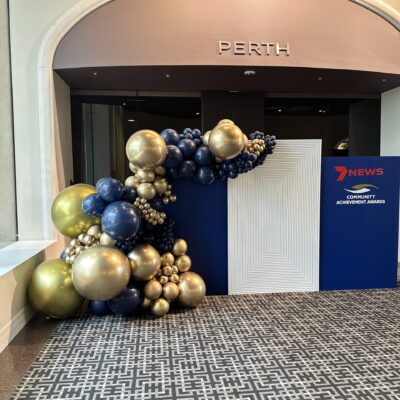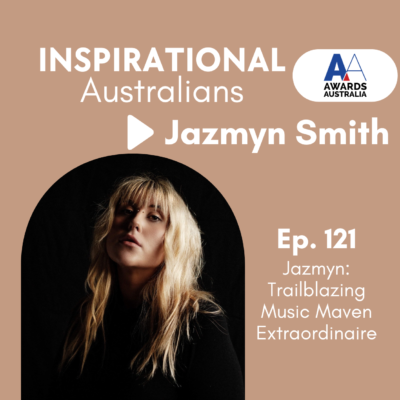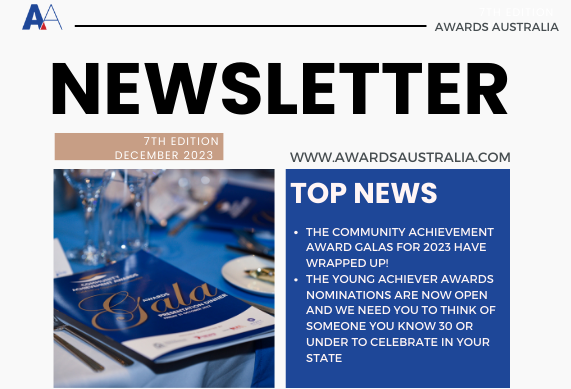In this week’s episode, Josh is talking to Jessica Dobrovic who was a Winner in the 2020 7NEWS Young Achiever Awards, South Australia.
Jessica Dobrovic is committed to improving the homelessness sector in Adelaide and across Australia, through her PhD studies and employment. Jess is an analyst for Aspire Social Impact Bond at Hutt St Centre, the first bond in Australia to focus on homelessness. Through research, she helps build understanding of the impact homelessness has on the individual and systems. Jess also works within the Adelaide Zero Project in collaboration with other services, aiming to achieve functional zero rough sleeping by end of 2020. Jess also volunteers for the Hands on Project, providing prosthetic hands for people who have lost hands in developing countries.
In this episode:
- In our first ever Facebook Live interview, we hear how Jess is committed to improving the homelessness sector in Adelaide and the power of work that she is doing
- Be inspired by Jess’s positive nature and take with you her motto of smiling at people she doesn’t know in the hope of making their day brighter.
Links
Connect with the Hutt Street Centre on Facebook
Want to know more about the Hutt Street Centre or how you can help? Hutt St Centre
Follow us on our Inspirational.Australians Instagram Page
Want to nominate someone? (It can take as little as 2 minutes to recognise someone making a difference)
Like some more information on Corporate Partnership?
Transcript
Annette (00:04):
Welcome to the inspirational Australians podcast, where we chat to people, making a difference in their communities and in the lives of others. And here is your host for today, Josh Griffin.
Josh (00:20):
Well, uh, if anyone who who’s joining the Facebook live now, sorry for the delay. Uh, we had some issues getting everything up and running, but the good news is we do have Jessica Dobrovic here with us, winner of the University Senior College Create Change Award. So thanks for taking some time out of your day, Jess, to, uh, to join us, um, to chat with us. And, um, just to, yeah, it’s great to hear from you. So can you let us know where you are now and what you’ve been up to today?
Jessica (00:54):
Uh, I’m at work today. Uh, so what I’ve been up to today, I’ve been doing lots and lots of data work in the homelessness space where, um, we’re in a big process at the minute of a big service system change. So as a, as a senior analyst here, I’ve got to be looking at all of the data that we’re collecting, seeing what we can show that it’s impactful and yeah. Just seeing what I can do to contribute to the upcoming system change.
Josh (01:20):
Okay, great. And for those who don’t know what Hutt St is or what it’s all about, would you mind just giving a little bit of background on that?
Jessica (01:27):
Yeah, sure. So Hutt St is a homelessness center in the CBD. We provide, uh, things on site. Well, unfortunately, due to COVID at the moment and what’s going on, it’s a bit difficult for us to be able to provide as much support as we’d like, but we are providing things like basic needs for people. So, showers, local facilities, meals, all of the sort of basic services. And then we also have case management support that’s connected to Hutt St Centre. So, we have a crisis service, we have a long-term service that provides three years of support to people experiencing homelessness, to try and really end that churn and cycle for them. And then we also have some homelessness services designed to help people who are a little bit older and people who are sort of experiencing premature aging, which can happen when you’ve been experiencing homelessness for such a long time.
Josh (02:17):
I’m a bit sheltered to this really, because a lot of the time when, if I come across homelessness, it might be when I’m going into the, into town to the city and you know, you see some people on the street and that kind of thing for those like me who are a bit sheltered to it, you know, is it prevalent throughout the state? Is it focused in certain areas? Like, I guess, is there any way you can shed some light on people for where they might come across homelessness?
Jessica (02:43):
Oh, sure. So I guess the best way of showing that is with the data. So, um, at any given night in South Australia, about 6,000 people will be experiencing homelessness. And I guess you don’t really see that on the street. So homelessness can look like a lot of different things. It might people without a permanent address, it could be people fleeing domestic violence situations. It could be people who are couch surfing and don’t have a place of their own to stay, or they’re fleeing a place that’s not safe for them to be, or they could be sleeping on the streets. They could be in some of our emergency boarding places, which are not only in the city, but in the suburbs as well. There’s many ways that you can be experiencing homelessness. And then I think the, the most impactful conversation I had with somebody was in my first month as a, a student working in homelessness, where somebody said to me, you know, we see you, but you don’t see us, which I think is very true because if you’re not really clued in, or if you don’t really think about it too much, I think that you could probably go about a walk in the city or anywhere else and not really notice, which is, uh, a little bit sad and sort of one of the reasons why I became so passionate about working in this space.
Josh (03:53):
Yeah, for sure. Like that’s a really cool point about, well, not cool point. I shouldn’t say it’s interesting like that, that they see us when we don’t see them and even, you know, my language then them and us isn’t ideal, but I guess that’s why it’s so important that we’ve got people like you Jess, and these awards that we can kind of put a bit more of a focus on these kinds of stories and share a bit more insight. So it normalizes it so that I think if it’s normalized, then you can do more about it than you can be educated about it.
Jessica (04:21):
Absolutely. And I think it’s sort of changing that notion about what a typical homeless person might be as well, because truly there is no way to be a typical homeless person. You know, the experience of homelessness is like a kaleidoscope. When you think about it, there there’s no real one reason why somebody becomes homeless. When we look at the stats, you know, over a quarter of the people who come through here, identify receiving a tertiary education, it’s not just about somebody who might’ve fallen into homelessness for their own volition. There’s so many reasons. And I think that that’s really important to recognize.
Josh (04:54):
Yeah, totally. Now casting your mind back to it and kind of bringing this back to the Young Achiever awards, if you can think back to, I think this would have been last year. Cause that’s when we opened nominations 2019, it took us a year to bring this program, you know, from start to finish. So when you were nominated, do you recall what happened with the nomination process? Were you surprised by it? Was there something you heard about later or at the time, you know, can you, I guess give us some insight and what that was all like?
Jessica (05:29):
Yeah. Well, I was nominated by a dear friend who I work with. Who’s very kind, but also, yeah, I tend to like to fly under the radar. So the, these sort of things are always a little bit, uh, not only humbling, but quite daunting. Uh, but it was a beautiful thing. I think we got notified in early January. Oh gosh, 2020, as we all know has been a little bit of a smoosh of a year. It’s hard to place where things were, but, um, it was really humbling phone call. And I remember just smiling all day thinking I just do this stuff because it’s what I like doing and what I’m passionate about. It’s incredible that it’s actually something worth acknowledging. And then the more I spoke to people about it, the more I realized how little people knew about, you know, not only homelessness, but I was also nominated for some work that I did fitting hands on people in Cambodia who had lost hands through many various reasons. And yeah, if it’s just one of those really interesting times when you take stock and reflect on what you’ve actually done. And I think that we don’t really do that enough. We’re probably always too busy going to the next thing. And I think generally we don’t particularly like to talk about ourselves in a, I’m so good or I’m doing all of these cool things kind of way. So it’s a really nice opportunity to be like, no, actually this is good stuff and it is worth talking about. And it was just quite fun after a while.
Josh (06:44):
Yeah. That’s great. And so it did, it did kind of cause you to reflect today on some of those things?
Jessica (06:50):
Yeah, absolutely. And not only reflect, but just thinking about other things, you know, the more you talk about something that you’re doing, the more ideas pop into your head about, Oh, I’ve said that I’ve done this before. Maybe I could add onto that next year or maybe I could do something else. It’s, you know, the opportunity to sort of critically reflect on your journey thus far and how you might be able to keep going or go in different directions, especially, you know, unfortunately we didn’t get to talk to many of the other winners face to face or any of the other nominees. But when I heard about the work that they were doing as well, it’s equally inspiring. Can you really just get a sense of just such a value in the South Australian community? It was really cool.
Josh (07:29):
Yeah. And that’s a good point about not being able to connect with the winners because year after year, that’s something we hear is one of the great benefits of, uh, of being you’re nominated and going along to the gala dinner event is that you’re just in this room full of hundreds of young, South Australians who, uh, achieving incredible things. And there’s so many different, um, fields like of, of achievement and, and kind of community involvement. So it’s just this incredible place to be. And, uh, what we tried to do is actually, you know, along with everyone else, moving things online is we, uh, for years and years we were thinking, how do we foster that outside of the event? And, you know, it was just staring at us in front of us the whole time. It just, Facebook groups are so easy to do. So it’s one thing we have started, um, for anyone nominated is they, uh, when they finished the program, they get invited to the alumni group and it does try and keep that connection going and people can work on projects together and support each other’s ideas. And, um, yeah. So that’s another kind of, uh, in addition to what you were talking about the way we’ve tried to kind of foster that, um, it does anyone watching that kind of things, you know, Oh, I know someone like Jess who’s, you know, quote unquote fly under the radar type of person, but they’re doing great work. Um, but then they don’t realize how impactful it is. What would your message be to them to kind of, you know, encourage them, should they go ahead and nominate that person?
Jessica (08:51):
Absolutely. I think even just to be known at it as fantastic experience, and also, I just think so often we spend a lot of time stuck in that negative space. So we spend a lot of time going. I really don’t like this, or this is happening and we don’t really stop and acknowledge the great stuff that people are doing. Or the things that we really like about people, so even just to have that acknowledged about someone is just so fabulous. I just think it’s so worth doing
Josh (09:18):
Well. Um, yeah. Thanks for that. So you did mention something earlier, which, uh, I got carried away with talking to you, but I do want to circle back to the, um, is it the Hands on project? Is that what it’s called? Then you went to Cambodia for that. So firstly, had you been to Cambodia before?
Jessica (09:34):
No, not to Cambodia specifically.
Josh (09:36):
Yeah. So you’ve come to this new place and, uh, it’s pretty it a lot. So if anyone was saying the, uh, sensor lights might go flying off. Hilarious. Um, so yeah, so you’ve come to Cambodia and tell us more about this project.
Jessica (09:54):
Uh, so it was a bit a bit getting thrown in the deep end. So we went across, uh, uh, regions, rural and metropolitan regions of Cambodia and effectively we were connected with, um, Cambodian rotary clubs and other clubs who had sort of contacts in the community and effectively what we had done prior to that is that we had run workshops in Australia where people would, uh, pay to fit hands. And then they’d write a note to whoever was going to receive that hand about who they were. And then we would go fit the hand in Cambodia and then we’d get a return message so that anybody who’d made a hand in Australia was able to know where it went and what happened to that person, how they may have lost their hand and what it was going to help them achieve now that they were able to, you know, do more things with their hands. And, um, we also, you know, we went into prison in Cambodia and met a lot of people in a prison, which was just an incredibly humbling experience. And, um, you know, people who’d lost their hands because they were trying to build things and they lost both of their arms and electrical accidents. And we just think about if that had happened in Australia, how different it would, it would be, you know, it’s, uh, it’s a definitely crazy experience. And, um, people who might’ve lost at hand during, uh, the Khmer Rouge regime or people who may have lost their hands for various other reasons, or even people who were born without hands and got to use a hand for the very first time. Yeah. It’s just, it was such an array of experiences and hearing every individual story was just, uh, I don’t even know how to describe it. It was just so beautiful to be able to experience that and stand alongside them as they were sharing what they’d been through in their life thus far. I think we really truly don’t realize how lucky we are until we really are able to even have the privilege of supporting people who aren’t as lucky as we are. It was just, I would do it again in a heartbeat given, uh, given that we’re not allowed to do, but eventually I would love to do it again.
Josh (11:56):
Yeah. That must be weird to kind of, um, to think about like, I’d love to do it again, but I just can’t at the moment sometimes it’s yeah financially or whatever, but this time you just can’t.
Jessica (12:09):
I know, but it’s, it’s good. You know, maybe we can plan something bigger and better in this time. I try not to think about, I mean, I think a lot of people and myself included have been caught in the what you can’t do. Um, it’s so easy because there is a lot of negativity and it’s definitely worth acknowledging that this year has been quite an unknown, uh, strange year, but that doesn’t mean that we can’t use this time to make plans for things that could happen in the future. And we might be able to help in an even more impactful way, given time and planning and all of that jazz. So try and keep it flips to a positive.
Josh (12:42):
Yeah. So speaking of, um, you know, of your passion and kind of you’ll want to go and do these incredible things for people, what is it that drives you to do that? What kind of motivates you to, to do these kinds of things, whether it’s working at dedicating, you know, your PhD and your work there at Hutt St to homelessness and addressing that. And, uh, you know, to further that by going to other countries to kind of lend your assistance there.
Jessica (13:08):
It’s just recognizing for me, I had a really beautiful childhood and I, you know, I’m actually one of the fortunate few who got to experience life in that way. And I think the older that I got and the more I saw systems that we worked within and the more I met people from different walks of life, the more I just realized that I just felt a sense of responsibility because, you know, I have, I have a lot of fabulous things that not everyone else has. And I really don’t. I don’t think that that’s from any other reason, other than being lucky that we were, I was born into a lovely family, you know, a lot of people aren’t as lucky. And so I think if you can, then you probably should, if you can. And so after that, and after meeting a lot of humans in different workplaces and working with a lot of people and alongside a lot of people, it just kept growing and just keep growing more tenacious as I get older about wanting to continue to do this sort of stuff. I think that it’s just, just so important if you can.
Josh (14:07):
Yeah, no, that’s true. Well, I’m not wanting to change the text too much, but I did want to kind of mention that we were going to have, um, some of the other winners on the, uh, the Q and A with us, but, uh, um, errors. Unfortunately we were unable to get them to join. Jess was, uh, the legend who somehow magically got past the IT barriers, I think technology barriers that have blocked everyone else. So, but Edwin, um, was so quick, he couldn’t jump on. He won the, uh, Carclew Creative Achievement Award. And, uh, for anyone who watched the online events, you know, it was a bit, I was a bit jealous actually because, um, at Carclew, uh, up in North Adelaide, they had a COVID safe event where they were able to fit, you know, a bunch of people, um, into their venue there and have a bit of a, uh, physical party and a celebration. And he was able to be awarded their live in the event, which was pretty cool. So, um, but like I said, he was so quick, once it wasn’t working for me, he sent in this blurb and he asked me if I can share it. So what he wants to talk about specifically was, um, well, a few things he wanted to talk about, but he actually said something that was so similar to what you share, Jess in about, you know, the nomination process and how it was really lovely. But for him, he was actually nominated by colleagues at, Oh, well, it’s the same as you, isn’t it nominated by a colleague at work. And, uh, but they kind of said, Edwin, I’ve nominated you, but you know, I’ve written a bit of a blurb. I think you should fill it out the rest of this form by itself. And, uh, for anyone thinking about, are they going to nominate someone or are they going to, um, you know, be as a prize for them or get them involved, you can be anything. We get every single type of nomination. We get, um, young people who are really driven in their career and they approach it like a job application. And I think that’s, that’s awesome. It’s such a, um, forward thinking, you know, proactive thing to do, because this is something you can put on your resume. You’re a nominated in the young achiever, what, or you were a finalist, whatever it is. And so with Edwin, yeah, he got nominated and he was a bit, he felt awkward at first is what he shared. He said, it can feel very awkward at first to write about yourself, but it’s really worth doing to be able to nominate yourself for awards like this. It’s not about being self-indulgent if your work involved doing great things, then part of it is also about how you can get the message across. And these awards are a great way to do that. You don’t have to fill a nomination with adjectives, just take the facts. And this is what Edwin kind of was faced with is, and you mentioned before, I don’t want to talk about myself and, you know, and seem like, um, um, giving must be hurting myself. So, and that’s what admin phase two is like, Oh, how do I write this? And so he decided to just focus on facts. Um, and I’m at Libby. This isn’t exactly his message now, but what he said here is you don’t have to feel the nomination with adjectives. Just take the fact, for example, in 2020, I did X, which was successful because of Y and it resulted in Z. So, you know, you can see his, which is interesting. He’s got a bit of a mathematical approach to, uh, and he’s an arts kind of a theater guy. So, um, so he’s talking about list, the facts list what’s happened and what was a result of those things. And then one way to, to really kind of try that home is to say, and this is what so-and-so said about that work. Um, and that way, you know, I think he can safely say, you’re not big noting yourself. You’re not being arrogant or anything like that. Um, it’s about getting out important messages. Um, and that’s what the Young Achiever was or about in essence, it’s about sharing the stories of young people and their messages and giving a platform, those messages, because without a platform then, um, sometimes young people can go without a voice. And there’s one phrase I hear all the time, which kind of irks me a little bit is that, um, all your young people are, there will be a great future leaders. And, uh, I’ll ask States in, in future States in great hands. And that is true at the same time. I always say that young people are leading right now and that they’re doing the job right now and their voices need to be heard now. So that’s kind of, um, you know, in talking with Edwin the message he wanted to get across and it echoed our message for the awards as well. So, Jess based on that comment, what are your thoughts around that? Like, how do you feel about that?
Jessica:
About being a young leader now?
Josh: Yeah, it doesn’t in terms of like, um, you know, the young people, you know, and that are in your environment, what would do you have people that you think, you know, that you could nominate as well?
Jessica (18:41):
I may think that yes. Maybe thinking about nominating people already, but, um, I just, yeah, there are so many young people who are passionate out there and, you know, I think that an acknowledgement of their passion is a really important step know. I think that people often feel a sense of, um, I don’t know, maybe frustration or they’re doing things over and over and they don’t feel like it’s being noticed. And it’s just a great way of being able to show people that they are seen in their efforts and noticed, and that they are really impactful and important regardless of their age. And regardless of how new they are in a sector, you can make a change for anyone in one day. You know, it’s, it’s a fabulous thing to be a part of and definitely got a few nominees up my sleeve.
Josh (19:24):
That’s great. Thank you, Jess. Now, um, kind of, uh, switching conversation, we missed it, everyone and water, the camera’s are made, but you just go up again. What’s the, uh, what’s the cycle like is every 10 minutes. I really don’t know.
Jessica (19:42):
We’ll see how it go. Try it doesn’t happen again.
Josh (19:46):
So, Jess, I wanted to ask you also about, you know, before this year, before this crazy 2020, um, what was going on with you and your research and how’d you get started at Hutt St and can we rewind and ask you a little bit about that?
Speaker 3 (20:01):
Yeah, so I started at Hutt St out as a student, so I’m a bit of a nerd captain. I like to collect them some degrees because I felt with that, you know, study and research, I couldn’t make the impact that I wanted to. So that’s why I’m doing my PhD now, because I feel like once you, once you’re a doctor, no one can argue really, hopefully. But, um, I just, I started here as a student when I was working as a counselor with young people and just fell in love with the service itself and just really, really enjoyed working with adults as well as young people who were experiencing homelessness. And I just, I met so many fabulous people into my, uh, my role as a student here was to actually do a bit of a project around loneliness and what loneliness looks like for people who are homeless and perhaps potentially people who are housed. And what we did find is that people were actually more lonely after they were housed, which makes a lot of sense, because, you know, when you, when you are experiencing homelessness, you have a community that, you know, and you understand, and then when you get placed in a house, you may have never lived in that suburb area before you may not know who to contact or where any of your local services or even shops are, you know, and it’s quite an isolating experience to finally be housed. So after I did that research project, I was just so, so intrigued in all of these different aspects of homelessness and what it could mean. If we could change that loneliness feeling maybe that would help end the cycle of homelessness for a few people, or what else is there about, you know, being housed that we might be able to work on. And then it just, just really started to get me to think about how individualized homelessness is for people and to how important it is to start to look at individual ways we can work on addressing homelessness and it just kept on growing from this. So it was just more about being really curious and intrigued and just very grateful that I got an opportunity to speak to so many people who were experiencing homelessness and try and understand things from their perspective. And yeah, it was just, it just grew and it’s still growing and it’s, it’s really fabulous and Hutt Street. You know, I’m grateful that Hutt St have kept me on for as long as they have. And now I get to, you know, do analytics most of the time. And I get to really start to understand and demonstrate how homelessness isn’t uniform and how, you know, there are so many different ways or different areas that we could all work together to try and stop this experience for people so that we don’t continue to see people coming in and out of homelessness for the same reasons that we can hopefully work together to try and prevent. And it’s been really great talking to other people in the sector who have the same passion. You know, there are lots of little hidden people out there who are doing very similar things to me, who I am excited to nominate, but also who are, um, who are really fabulous people, because there are lots of people with big hearts and lots of passion for homelessness. So we’re very lucky here in South Australia.
Josh (22:52):
Well, if anyone has a question for Jess, then they can pop it into the comments. Um, but whilst we’re waiting for those questions, I do want to ask you, you know, you, you kind of touched on that. I’m going to speak to so many incredible people and they were willing to speak to you. Was that, is that common that, that people were really wanting to share their experiences? Or did you have to kind of draw it out or, or what was it like?
Jessica (23:15):
I think it’s hard to answer that question without saying everybody’s, you know, everything is different, but, um, I think that for, for me, it was mostly just about coming at it from a really humble place and potentially not asking people the first time you see them, you know, it’s about building that relationship or, you know, having some informal things in common. I think too often, we, we ask a lot of people who are potentially marginalized and vulnerable and we don’t necessarily give context or, you know, I guess build that sort relationship. So maybe it’s just about having some informal chats to start with and just making sure that it doesn’t feel like it’s somebody having to regurgitate their story for no reason, you know, talking to them about why we might be asking them questions, what’s going to happen, you know, all of those sorts of things as well. So it’s not just, you’re going to tell us your story and we’re not doing anything with that. I think really giving them the whole picture and making sure that people understand that it’s not just about us collecting information is probably a good place to start.
Josh (24:15):
Yeah. And so, you know, you’d love that you call yourself a nerd because that phrase definitely needs to be noted the best
Jessica (24:24):
Pleased to be taken back. It’s positive.
Josh (24:26):
Exactly right, I’m a nerd too. I’m going to say with analytics though, I think we run into analytics. Like, you know, it’s hard for me to comprehend what’s a day in the life of an analytics, you know, what does it look like?
Jessica (24:39):
Oh, it varies from day to day, but I think there’s a lot of things around doing a demographic cross sections and trends to sort of understanding if there are any patterns across different age groups or different genders, or, you know, what what’s going on for people in different, different demographic cross sections that might indicate any sort of trends or is there a particular time of year where homelessness is, you know, experienced more so by particular cohort? So it really just depends. So potentially what a day might look like is we might get contacted by a staff member and they might say, I’m seeing X, Y, and Z. Can you see if you can prove that in the data? And then we might look into our data and say, if there’s any way that we can prove whatever they’re talking about or not prove it so much as just see it in the data. And then we might look at graphing it, I, I really do feel like graphing things or presenting things in a visual way is a really good way of getting people to understand what’s actually going on because just giving people numbers is a little bit dry and can often be a little bit de-motivating. So it’s also about getting the message across to staff about their impact and showing how many people they’ve supported and how many people have been housed and stayed housed. And, you know, all of those sorts of things too. So it’s data can be used for so many different things, but yeah, I think that it’s so broad, which is why I like it. I think I’d be bored if I came to work and had to do just one thing all the time.
Josh (26:00):
It sounds like it’s just so multifaceted. And even though it’s dotted like the data’s got all different areas and so it could, you know, and for people who love graphs, I, I know for a fact that they, Oh, look at this one, that’s a good, what are you, what’s your favorite graph?
Jessica (26:15):
Well, it really depends. I don’t really have a favorite, but, um, I do, I do just like, you know, even showing, say, for example, during COVID how many people we have, we saw a big jump in housing outcomes for many reasons, not one, not being state government, actually supporting a clever response to putting people in housing who were experiencing homelessness during that time. But you can see this big jumping out of data. So if we pop it into graph, put a little arrow to it. So this is your impact, congratulations, but, um, there are other really cool, cool things when you compare in cohorts and you can actually demonstrate a really impactful difference in a cohort that’s, you know, something positive has been happening. And if you can, if you can graph that and then show up with a little bit of story, I think it’s just a fabulous way of showing people that they have an impact.
Josh (27:04):
Yeah. And speaking of COVID, is that kind of, uh, you know, there was a big impact that you said is that kind of been carrying on? Is that just, you know, something sustainable maybe, or…?
Jessica (27:14):
I think that one thing that, uh, many things COVID has taught us and continues to teach us. And I have a feeling that it won’t be going away anytime soon, but what it has taught us is that as a community, as a homeless community, we were really able to best together and support people into, you know, emergency motels or accommodation. You know, I think that one thing that people might not have thought about when a national health emergency was declared is that actually having a safe place to isolate is a privilege. Um, there were lots of people out there who didn’t even really have a safe place to isolate. And if you can imagine people not really understanding what’s going on, or maybe not having all of the messages and then not really knowing where to go, or how do I have a safe place to be. I think it was just a really hectic time for a lot of people. And I mean, people with homes included, but, um, I think that the, we all did the best that we could with what was happening. And we sort of had to build planes as I was being flown, as I think a lot of sectors did, but, um, homelessness is going to definitely be impacted into the future because of COVID, especially considering all of the reasons why somebody might become homeless.
Josh (28:22):
Yeah, for sure. Now, when someone’s sent through a question, I’m going to open this up. So people, can see if they are joining on the Facebook live. So, um, the question was, I think it was more of a generic question. If we want to support your work, what’s the best way we can do that. Now I’m gonna assume that’s directed at you, Jess. So people, if people want to support your work, you know, the work you’re doing in the Hutt Street, how can they, can they do that?
Jessica (28:49):
I guess the best way of doing it would be just get in touch with Hutt Street Centre is probably, um, depending on how exactly you wanna support it. Uh, if you want to just get in touch with that basic Hutt Street Centre, phoneline, I’m sure that a lovely humans who are manning the phones would be able to direct you to, however you would like to assist. We have various roles for volunteers, we have, you know, a lot of different ways that you could get involved and support people experiencing homelessness in the Hutt Street Center specifically. So give us a ring or to do something like that. And I’m sure that the lovely humans heren will be able to direct you.
Josh (29:24):
Now let’s cover up all our bases in case there were asking about the Hands on Project as well.
Jessica (29:30):
It’s not running at the moment.
Josh (29:31):
Yeah. So is there some way that they can follow the progress or something like that, or,
Jessica (29:37):
Uh, unfortunately not at the moment. We’d have to, um, the hands-on project as it stands is not active. So we would just have to wait and see what happens in the coming few, six months to 12 months. It’s unfortunate, but it is on pause.
Josh (29:51):
Yeah, no worries. Well, um, well, you know, like I said, covering a full basis in case they were talking about the awards as well, the best way to support it is just to make a nomination. And there’s a few ways you can do it. Um, you can find our Facebook page or 7years Young Achiever Awards SA. Obviously, if you’re watching this live video, hopefully you’re on there. And, uh, you can just, you can message us on any of that posts. You can comment and tag someone in and, you know, as you said, you should adjust that as the humans that look after you get in touch and tee it all up. But the best way probably, um, is on youngachieverawards.com/SA, and select click the little SA button. And there’s two options. You can nominate someone and submit a full nomination either way on their behalf, or you can start it and say, even you get login details, email to you. So, you can pick up where you left off. And that way you can get people involved along the way. The other way is you can refer someone. So, and what that is what I believe with what happened with Edward, who I was talking about before his colleague jumped on, referred him for an award in a, um, set it up. So it said everyone who’d been nominated, but he used the form. You got to fill it out. And so for people, you know, and Jess, you’re talking about, you’ve got a few people in mind. If that’s the case, then I would say referring someone, is probably your best bet. If you’ve got multiple people, cause you probably won’t have time to do all the applications. So you can refer someone in, in two or three minutes, you just provide some contact details and little blurbs so that we know why they’ve been nominated. And from there our team, we get in touch with them and we help them to put the nomination together. Um, we’re there to support them along the way. So if they need tips and tricks and, and that kind of thing, um, and we will help them get that all finished. And so plenty of time left nominations closed in February. So it gives people a chance to get their Christmas out of the way. Um, and you know, especially if the people at school, um, they won’t start school probably until the end of January, perhaps even the start of February. And, uh, so you can jump on young achiever what’s dot com get started today and finish it off later. That’s probably the best way to do it. So Jess, I want to thank you for joining us today and telling us more about your work, because it’s so interesting. It’s incredible and just, you know, vital, um, for, for so many people there in South Australia. So thank you. And, uh, you know, if, if I want to put you on the spot here and see if you want to have a parting message to everyone.
Jessica (32:17):
Well, um, perhaps it’s, it’s just such a to acknowledge that I definitely don’t do this alone. There are a lot of other fabulous people out there who are working in homelessness and, you know, there, there are a lot of amazing things happening. So if you are interested in homelessness, there are so many people to get into contact with. And there are many great advocates here in South Australia that I’m very grateful to know, and I wouldn’t be doing, I was doing without their support either. So it takes a lot of people as well to make a change. And when you find your people, it’s always really fabulous. So, I’d like to thank a lot of other humans who are out there doing great things for people experiencing homelessness too. And thank you guys for letting me be a part of this.
Josh (32:55):
No worries. Well, before we do, let you go, another question has come through. So I’m just going to get you to answer for before you go. So the other question is, well, it’s a bit of a statement as well. Thanks for sharing your story, Jess, you speak so well. What advice would you have for young people to build confidence in sharing their own stories?
Jessica (33:16):
And sharing their own stories?
Josh (33:18):
Yeah, confidence to share their own stories.
Jessica (33:21):
I think, uh, I think critically reflecting on your, your time is probably a good place to start. So, um, and even just talking to people. So if you talk to somebody that you trust or that you respect, and if you kind of get, get some positive feedback and build yourself up, I think that it’s a really good place to start going, Oh, okay, this person’s really interested in what I’m talking about. Maybe more people could be interested in what I’m talking about and even just little baby steps of sharing is a really good, good place to start. And even, um, for me, I always preface things. So I used to just start talking about nerdy things and I’d be like, just tell me to stop if you get bored. And nobody used to tell me to stop, which was probably a good way of me going, Oh, hang on. Maybe what I do. Isn’t so boring. Um, so there are lots of little, little steps, I think, a good way of starting to really talk about things that you think are important and impactful.
Josh (34:12):
Yeah, for sure. And I think one thing that you actually mentioned before, I’d just like to quickly highlight as part of an, an answer to that is that, you know, you got nominated by someone and, um, you said all sort of flying to the wall, but they noticed that those are noticed. And sometimes that’s all it takes is just to, you know, we’d love it to be a nomination, but if it’s just a text message, a pat on the back, a phone call, just tell someone out there that you think is doing a great job. Hey, you do, you’re doing a great job. Like, and you honestly, you make that person’s day.
Jessica (34:40):
Yeah, definitely wrote as a lot to be said. Um, I guess another final little homelessness story to share, as well as that I remember in the second month I worked here, I, somebody had thanked me for actually smiling at them and that was the nicest thing that happened in their day. And so I think that we really underestimate as people how much impact we can have on others. And, uh, even just letting the smallest, smiling at people, or know, just having a conversation with somebody might be the only conversation they have in their day, or it might actually make them feel differently about the world for a day. So I think that, um, we all underestimate that impact and we all can have a great impact. So I think that, yeah, that’s one thing to mention too.
Josh (35:20):
Thank you, Jessica. Once again, appreciate your time today. Uh, honestly, it’s, um, it is, we ended up chatting for quite a while, so, so thanks for that. And uh, I want to acknowledge, um, Holly who was producing. Thank you, Holly. Um, and when you’re ready, Holly, you can, uh, put us on the final little screen cause we’ll close out. And lastly, I’d also like to acknowledge, um, Edward and Taylor Kyle and Shane Cook and Monique Shamilaguy, and also Lauren Mayer who all really wanted to come on to this Q and A. And I was so excited because we had six of our winners who were so keen and the little tech issues, um, unfortunately stopped that from happening. So we’ll try it again and, uh, thanks to everyone for tuning in. Thanks for those people. We popped into question and, uh, yeah, we look forward to getting your nominations in and there Shane onscreen is our current Young Achiever of the Year.
So, uh, just remember if you do nominate someone, it will be a huge, huge kind of acknowledging for them. And it gives us a chance to share the stories exactly like Jess, how we’ve been able to share her story because it’s such a, it’s a beautiful thing. So Jess is trying to get lots of interesting. It wasn’t it was that a bit of get off. All right. Thank you, Jess. Appreciate it. Talk soon.
I hope you enjoyed that interview. If you liked it or any of our other episodes, it would be great. If you can rate and review the inspirational Australians podcasts, it really helps us out. If someone, you know, needs a little dose of inspiration, why not let them know about this podcast? And if you haven’t already, make sure you subscribed so that you won’t miss an episode, join us each week as we talk with ordinary Australians, achieving extraordinary things, you can always head to our website at awardsaustralia.com/podcast, for more information and details on each guest. Now, before we go, I’d like to thank Annette, our producer. Here’s a fun fact, Annette is my mum and our other host, Jeff is my dad. This podcast is brought to you by Awards Australia, a family-owned business that proudly uncovers the stories of people who make a difference for others. We can only do this with the support of our corporate and not for profit partners as they make our awards programs possible. So, do you know someone making a difference? If you would like to recommend someone to be a guest on the podcast, get in touch through our Instagram page, inspirational.australians, or maybe your business might like to sponsor the podcast or get involved with the awards we run, head to our website, awards.australia.com for more details. Until next week, stay safe and remember, together we make a difference.
Annette (38:04):
Thanks for joining us today on the Inspirational Australians podcast, we hope you enjoyed listening and have been inspired by ordinary Australians, achieving extraordinary things. So, it’s goodbye for another week. Remember, together we make a difference.




